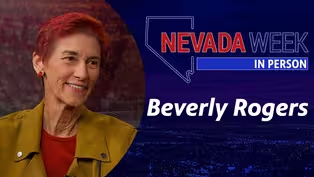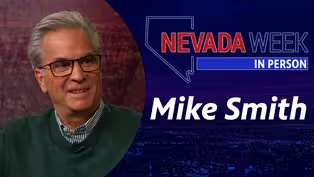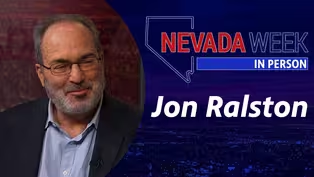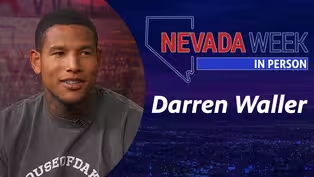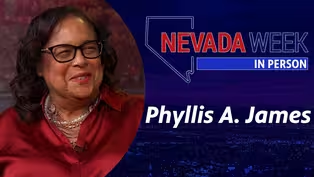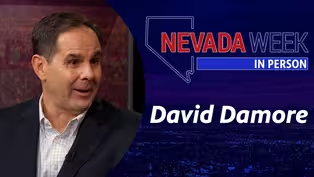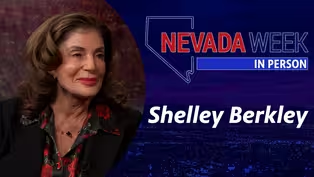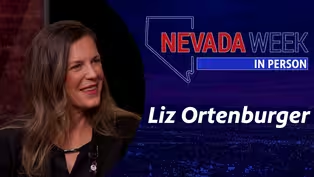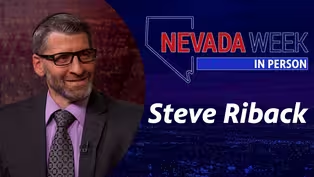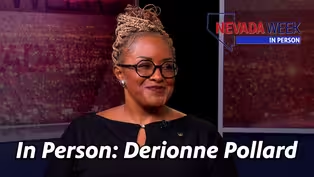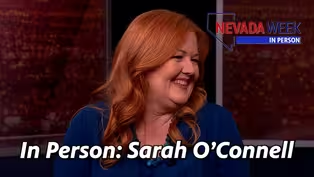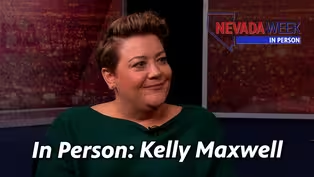
Nevada Week In Person | Michael Green
Season 1 Episode 11 | 14mVideo has Closed Captions
A one-on-one interview with UNLV history professor Michael Green.
We talk with UNLV history professor Michael Green about the history of Las Vegas and Nevada.
Problems playing video? | Closed Captioning Feedback
Problems playing video? | Closed Captioning Feedback
Nevada Week In Person is a local public television program presented by Vegas PBS

Nevada Week In Person | Michael Green
Season 1 Episode 11 | 14mVideo has Closed Captions
We talk with UNLV history professor Michael Green about the history of Las Vegas and Nevada.
Problems playing video? | Closed Captioning Feedback
How to Watch Nevada Week In Person
Nevada Week In Person is available to stream on pbs.org and the free PBS App, available on iPhone, Apple TV, Android TV, Android smartphones, Amazon Fire TV, Amazon Fire Tablet, Roku, Samsung Smart TV, and Vizio.
Providing Support for PBS.org
Learn Moreabout PBS online sponsorshipMore from This Collection
Nevada Week In Person goes beyond the roundtable discussion of Nevada Week with guests for a more casual conversation about their personal passions, new projects and compelling stories that are overlooked in the flurry of the news cycle.
Nevada Week In Person | Beverly Rogers
Video has Closed Captions
One-on-one interview with Rogers Foundation chair Beverly Rogers. (14m)
Nevada Week In Person | Mike Smith
Video has Closed Captions
One-on-one interview with Las Vegas Sun political cartoonist Mike Smith. (14m)
Nevada Week In Person | Jon Ralston
Video has Closed Captions
One-on-one interview with The Nevada Independent CEO Jon Ralston. (14m)
Nevada Week In Person | Darren Waller
Video has Closed Captions
One-on-one interview with Las Vegas Raider tight end Darren Waller. (14m)
Nevada Week In Person | Phyllis A. James
Video has Closed Captions
One-on-one interview Phyllis A. James. (14m)
Nevada Week In Person | David Damore
Video has Closed Captions
One-on-one interview with Chair of the Department of Political Science at UNLV David Damor (14m)
Nevada Week In Person | Shelley Berkley
Video has Closed Captions
One-on-one interview Senior Vice President for Touro University Shelley Berkley. (14m)
Nevada Week In Person | Liz Ortenburger
Video has Closed Captions
One-on-one interview with SafeNest CEO Liz Ortenburger. (14m)
Nevada Week In Person | Steve Riback
Video has Closed Captions
One-on-one interview with Las Vegas Metro Police Lieutenant Steve Riback. (14m)
Nevada Week In Person | DeRionne Pollard
Video has Closed Captions
One-on-one interview Nevada State College President DeRionne Pollard. (14m)
Nevada Week In Person | Sarah O’Connell
Video has Closed Captions
One-on-one interview with Director of Eat More Art LLC Sarah O’Connell. (14m)
Nevada Week In Person | Kelly Maxwell
Video has Closed Captions
One-on-one interview with Baby’s Bounty Executive Director Kelly Maxwell. (14m)
Providing Support for PBS.org
Learn Moreabout PBS online sponsorshipThe history of Nevada is endlessly interesting, especially for this week's In Person guest.
We talk with Michael Green, a man who has spent his adult life studying, researching and teaching Nevada's history.
♪♪♪ Support for Nevada Week In Person is provided by Senator William H. Hernstadt and additional supporting sponsors.
(Kipp Ortenburger) Welcome to Nevada Week In Person.
The Silver State has gone through many incarnations: ranching, mining, gaming, tourism and a lot more in between.
Michael Green has studied and researched that history.
He literally wrote the book on the state.
He joins us now to talk about that and a lot more.
Michael, welcome.
-Thanks for having me.
-So we were just talking about Senator Reid and I want to get maybe to Senator Reid's life a little bit later on, but I want to talk about you wrote the book on history and I want to come to that first, just the process.
You've written nonfiction books but you've also written textbooks from middle school all the way to higher education.
Can you give us some insight in the process and maybe what are some of the most challenging aspects of boiling all this information down into something that you find in an entertaining nonfiction book or even a textbook?
(Michael Green) Well, the process can be really difficult depending on how much information you've got to work with, and I have an old line about Nevada history that either it's been done and could be redone or it hasn't been done.
So usually you do a textbook based mainly on what other people have written, though you have done original research, you've been in the archives and I've been, but in this case you do have to dig a little deeper.
The other thing that's interesting to me about writing this is realizing that I had to talk about things that aren't interesting to me.
If you think about a textbook, when I've taught Nevada history over the years, the first chapter is usually geology, and I don't pretend to be a geologist and that's covered.
I'll often say well, the first chapter is on geology and that's covered in the book.
And I sit down to do the textbook and I thought oh, my gosh, I need to know this which led to a lot of extra reading and a lot of fascinating stuff I learned.
I found it fascinating.
But that's part of the process, writing about things that you haven't necessarily studied in depth before.
And people who've written American history textbooks or world history textbooks, they run into the same thing.
You teach differently than you write, but your teaching leads to the writing.
-Leads to the writing, yes.
Because a lot of the content you're developing is new, especially if you're writing history for specifically Las Vegas or Nevada, how good are our archives?
How do they match maybe an East Coast area that just has such a much more extensive storied history?
-You know, we are in very good shape thanks to Special Collections, the state museum and some other locations.
At the same time, a lot of our history has been, you might say, verbal in ways that it might not have been elsewhere.
There's an old line about Perry Thomas, the banker who was really the first lender here for casinos, and he said, you know, these guys didn't want a written contract.
Okay, so that means we don't have a lot of written stuff, and you kind of have to extrapolate a bit and you have to say well, all right, this is an FBI file.
What's correct there?
And then well, this is an oral history, how has that been affected by your own perceptions?
So you struggle at times with that.
The other thing that's kind of interesting is Ben Franklin is not going to challenge you when you write about Philadelphia.
But I write about current stuff, and occasionally you'll get someone who says hey, I was there, or maybe they'll compliment you.
That's nice.
But I tell the story that Frank Cullotta once stood up at the end of a talk I did on the Mob and said this kid knows what he's doing.
And I thought, thank God.
(laughter) -It could have gone a very different way.
-Could have gone south fast.
-Very impregnated pause before he answers that.
That's great.
You mentioned lecturing too, and I want to bring that up too.
UNLV is the most diverse undergraduate university, very diverse postgraduate programs as well, and you've been in history lecturing for a really long time.
Can you talk a little bit about that evolution and, I mean, do you have to change the way that you lecture and present something like Nevada history?
-Well, I was horrified to realize I entered UNLV as a freshman 40 years ago this fall, and it was similar but different.
We had a diverse campus, but less diverse than it is now if you think about the influx of Latinx people who have really arrived here in the last 40 years and now we're seeing more diversity in the classroom.
That means thinking well, all right then.
I need to make sure I am not just focusing on something that interests me.
Yes, I can emphasize certain things and, you know, you're doing the early U.S. history survey for example, you're going to get into the Founding Fathers either way, but are you covering the spectrum you might say, and I think I'm more attentive to that.
The other thing that's really changed, and this is a difference, is attention spans because today, you've got that phone, you might have that iPad and, I mean, I have debates with friends of mine whether we should allow them in class.
The answer is you can't really ban them that easily, and there are people who use them.
And I tell the story, this has been over 20 years, I had a student sitting there with his phone, and there he is during my lecture.
I thought okay, you little so-and-so, I worked my way around to look over his shoulder.
He's taking perfect notes.
I just thought, I wish I could do that.
My thumb's aren't that opposable.
-It's true, because there's an ambidexterity to being able to use a mobile phone and still able to engage, but it does change the way that you are presenting your lectures.
-Well, and another thing is PowerPoint.
I didn't do that.
I just wrote on a board.
That was great.
Well, I do a big lecture hall each spring, most springs, with about 200 students.
They probably can't see what I'm writing from the back of the room.
So okay, PowerPoint.
Then I realized the first time I used it, I'm putting a lot of text in there, and students are going oh, click.
And no, that's not what we want them doing.
So if someone says do you mind sending me your PowerPoint?
I'll say well, it's mostly photos so I don't know how much it helps you.
So yes, these are things you take into account in the classroom.
-Evolution of just how we interpret history.
I want to come to that and bring Senator Harry Reid back in just because our international airport of course is named for Senator Reid.
You provided testimony on maybe some reasons why we should change from McCarran, Senator McCarran Airport mainly because of some of his antisemitic views on things.
What I found interesting in that testimony is it's not that you said he wasn't antisemitic beforehand, he was, but the severity of where that went changed through your experience researching history as well in your own life experience.
How common is that for historians to then develop and kind of evolve their perceptions of history?
-It should be very common.
Sometimes people start here and they end here.
McCarran, I do not discount for example his importance in getting things like military bases, atomic testing, all of that, but had I realized the depths of his antisemitism until someone said to me, would you look into this?
No, it wasn't something I dug into in depth.
And I mean, we had a joke about a professor I had at UNLV that every year, he had a different view of Andrew Jackson.
Well, in a sense that's true.
You know, you go oh, okay.
Well, Jackson believed in democracy, and that's great.
Oh, but wait a minute.
What about slavery?
Oh, and Native Americans?
Well, that's a pretty horrible story.
So as you go along, you do think about these things or you should, and I don't want to over-quote him, but my graduate advisor, I like to say between us, he and I have won one Pulitzer Prize.
He won it.
But he was once interviewed and he said, in a sense it's not science.
History is not science, but there is a similarity.
The archives are our lab, and as you dig, you might come in with a hypothesis and it might change.
Sometimes it does, sometimes it doesn't, sometimes you're proved right.
Then you're amazed.
-And then of course trying to always prove that hypothesis or disprove that hypothesis becomes the focus of what you're doing.
Related to that, I want to get a little bit in.
We ask most of our in-person guests for their reflections on Las Vegas, depending on how long they've lived here.
You've lived here a very long time, and you bring an interesting perspective talking about that lab because you come from such an interesting historical perspective on a lot of what Las Vegas has become.
So I want to ask you, can you reflect on that history and how we have evolved over the years.
What is the most fascinating thread maybe through generation to generation that you find?
-I think the most fascinating thread is growth, and I use the term broadly because if you look at our censuses in the 20th century, we were pretty much doubling with every census.
But I like to point out when we went from about 1,000 in 1910 to about 2,300 in 1920, it wasn't quite the leap that we made late in the 20th century.
Then you look at the growth in terms of demographics, and we talked about this with Reid.
Well, the demographics have changed over the years.
There is an influx of African Americans, then we see an influx of Latinx, and more recently we have seen incredible growth in the Asian and Pacific Islander community.
So this is a thread that runs through it.
Then the other way I like to talk about growth is I am usually five minutes late for anyplace I'm going because there's always more traffic than I remember, right?
My family moved here when I was two so I wasn't thinking much about traffic, but I grew up in an area we called Las Vegas.
Now we call it East Las Vegas.
West Las Vegas was the segregated African American community that later became Latino and Latina, and now when we talk about West Las Vegas, do we really mean out toward the mountains?
You know, west has moved further west, and suddenly I was in East Las Vegas and I didn't know it.
So it's a great thing to study, and I use "great" in both the favorable and unfavorable ways.
-Right, and I think you just answered one of my next questions, but I'm going to ask it anyways and suppose maybe I have the answer.
So in your bio, assuming you had some doing here to put this in your bio, it says "He lives in Las Vegas but not in Las Vegas," and then in parentheses, "he can explain why."
I'm assuming that's what you mean is that Las Vegas is not Las Vegas.
-Yes, although I live in Paradise.
I mean, I have a great existence.
But of course when the Strip was being built, the operators did not want to be in the city, and when the city tried to annex them, they got the legislature involved and the County Commission and we ended up with Paradise and Winchester townships and later Spring Valley and there have been some other moves made.
But I live literally in Paradise, and I work closely with Senator Bryan who reads Nevada Yesterdays which I write and chairs the board of Preserve Nevada where I'm a director.
When he was governor, Citicorp put a credit card processing plant here in The Lakes, and the return address was "The Lakes," and there were people who were upset about this.
It's Las Vegas!
Well, at that time in the '80s, if you got a credit card bill from Las Vegas, you might be nervous, a little less nervous today.
But yes things have moved around here, and I like to say I've gone eight miles from where I grew up, and the history department has moved two floors from when I was a student so I haven't gone too far.
(laughter) -That's great.
A couple just real quick questions, and I want to bring it back to the history.
What do you think is the most interesting historical landmark we have in Las Vegas?
-I'm biased.
I confess my bias because I've been involved in it, so I'm going to give two to be fair.
One is the Mormon Fort which has the oldest structure in the state of Nevada and, you know, there's a tendency to think most of the early history of Nevada is up north and there's some truth to that, but here's the Mormon mission, built in 1855, '56, and we've got the oldest chunk of building.
I point to the Mob Museum-- that's my bias, I'm on the board, I was involved in the research and all of that.
The building is an artifact.
It's a federal building constructed in '33 at the edge of town when people here were debating how permanent this place was, and that gives a sense of permanence.
But a lot of fascinating things happened in that building, and now we've got this museum dedicated to this interesting past we have.
-Yes.
And as you mentioned, the Mob Museum or when it was the courthouse is such a pivotal part of our history and our transformation.
Michael, thank you so much.
-Thank you.
-We appreciate it, really appreciate it.
To see the conversation we had with Michael Green about the legacy of the late Senator Harry Reid, go to our website at vegaspbs.org/nevadaweek or tune in on Sunday at 5:30 p.m or Tuesday at 7:30 p.m.
Thanks for joining us.
♪♪♪

- News and Public Affairs

Top journalists deliver compelling original analysis of the hour's headlines.

- News and Public Affairs

FRONTLINE is investigative journalism that questions, explains and changes our world.












Support for PBS provided by:
Nevada Week In Person is a local public television program presented by Vegas PBS
